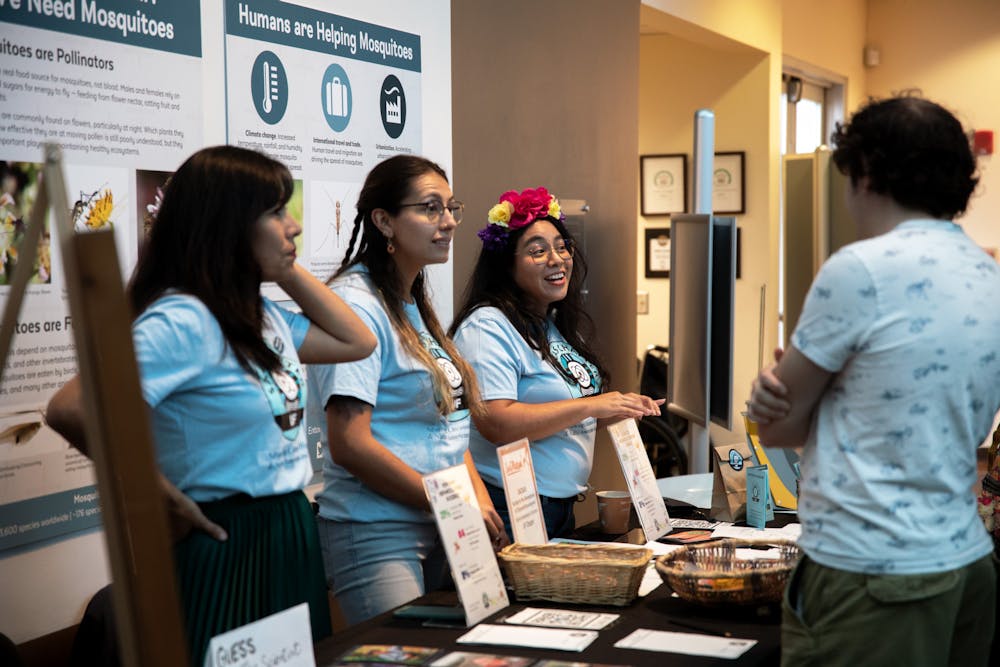From Sept. 15 to Oct. 15, Hispanic and Latinx food, music and history take center stage — gearing up for a monthlong celebration of culture and traditions.
In Gainesville, where about 12% of the population identifies as Hispanic or Latino, Hispanic Heritage Month is focused on embracing the rich Hispanic and Latinx culture within the community. But among the celebrations, there’s also reflection upon the history of colonialism in Latin America and the Caribbean.
Kaylinn Escobar, a 20-year-old UF public health junior who is Colombian-American, said she feels like the term “Hispanic” generalizes Latinx cultures and trivializes the history and customs the month’s supposed to honor.
Hispanic Heritage Month was first created as a weeklong commemoration by former President Lyndon B. Johnson in 1968, which former President Ronald Regan later extended to the entire month in 1988. Sept. 15, the month’s start date, coincides with the independence days for Costa Rica, El Salvador, Guatemala, Nicaragua and Honduras.
Because of this focus on Latin American countries gaining independence from Spain, Escobar said there should be more emphasis on Latinx culture in the month’s celebration — instead of the colonizing nations.
“The fact that they include them in dialogue does it an injustice,” she said.
A great starting point to understanding Latinx culture is access to Latinx history within educational institutions, Escobar said, in addition to schools encouraging discussion of the relationship between Latin American countries and the U.S.
Exposure to the background behind the creation of Hispanic Heritage Month can also help individuals understand how it can be interpreted as either inclusive or exclusive, she said.
“Hispanic as a term might be inclusionary towards me, but it isn’t for a lot of people,” Escobar said. “I think Latino, Latinx and Latina is a better term just to encompass specific Latin American countries — that geographic area and the perspectives and cultures from there.”
But for others, the term Hispanic is not only inclusive of their own identity and culture but necessary language for understanding the complicated history behind Latin American independence.
Cinthya Gaxiola, the 31-year-old English and citizenship class coordinator for Gainesville’s chapter of the Latina Women’s League, said she identifies as Hispanic due to her background. Gaxiola, who is Mexican-American, said her last name is of Spanish origin, her native tongue is Spanish and her physical appearance resembles one of European and indigenous descent.
The word “Hispanic” is a part of history, she said, and it’s important to acknowledge this history in order to understand how colonialism has impacted Latinx heritage.
“It is painful but necessary for us to reconcile and learn from it,” Gaxiola said.
Further, Gaxiola said she feels like the term “Hispanic” creates a unity between diverse cultures and countries — surpassing geography. It’s bittersweet that what connects Hispanic people is a language that was forced upon their indigenous ancestors, she said, leaving remnants of colonialism in people’s culture.
Although Gaxiola feels represented as Hispanic, she said she recognizes why members of Latinx communities may not share her experiences.
“I can see how other people may feel that it excludes them, especially if they are gender fluid or a member of the LGBTQ community,” she said.
Sofi-Nicole Barreiro, a second-year master’s student specializing in Latino and transnational studies at UF’s Center of Latin American Studies, said she finds Hispanic to be exclusive of many identities, including her own. Barreiro, 24, said she doesn’t like the term Hispanic, and uses Latina to describe her own identity, though she admires the inclusivity offered by the term Latinx.
Labels and terms transform over time and are often confined to certain parts of history, Barreiro said.
Hispanic as a term of identity, she said, was popularized by the U.S. Census Bureau, community organizers and Spanish language media during the ’70s and ’80s in order to gather more data on the population. In 1980, the bureau questioned the entire nation about their Hispanic ethnicity for the first time.
Terms like Hispanic, Latino and Latina are appropriate in different situations depending on context, Barreiro said. In an academic setting, she said, it’s important to stress inclusivity based on gender and language, which is something the term Latinx can achieve.
“I think identity has a lot to do with the terms that we use and feel comfortable using,” Barreiro said.
It’s also important to understand migration histories for Latinx and Hispanic populations who immigrated to the U.S., Barreiro said. These populations aren’t a monolithic group, she said — they have different cultures and motivations for leaving their countries of origin.
Barreiro said there’s a lack of education on Latinx history and the contributions of Latinx individuals in the U.S.
“Latino experience in the United States largely has to do with…asserting your identity as somebody who is not necessarily a white person in the United States — but somebody who has a more ethno-racial background,” she said.
Contact Isabella Marzban at imarzban@alligator.org. Follow her on Twitter @IsabellaMarzban.

Isabella Marzban is a fourth-year journalism major and an avenue reporter for The Alligator. You'll usually find her going on hikes, listening to classic rock on her record player, and doing yoga with her friends.






